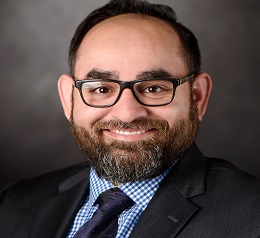Scholars International Webinar on
Drug Discovery and Development
THEME: "Key Concepts in Identifying Drug Leads"
 25-26 Aug 2021
25-26 Aug 2021  Online | Virtual
Online | Virtual THEME: "Key Concepts in Identifying Drug Leads"
 25-26 Aug 2021
25-26 Aug 2021  Online | Virtual
Online | Virtual 
The Ohio State University, USA
Title: Multiomics integration elucidates onco-metabolic modulators of drug resistance in lymphoma
I am a translational scientist and an assistant professor in the Division of Hematology at The Ohio State University. I was trained as a human geneticist and specialize in developing strategies for personalized therapy for lymphoid malignancies. I am also a member of the Leukemia Research Program at the OSUCCC – James, where my research interests include indolent and aggressive B-cell Non-Hodgkin’s lymphomas and multiple myeloma. The focus of my laboratory is to understand the role of tumor microenvironment in the progression of B-cell lymphomas. We have identified a subpopulation of tumor cells capable of initiating the bulk tumor and are trying to identify the therapeutic target unique to these initiating cells. I am also interested in understanding how non-coding RNA regulates epigenetic marks and contributes to drug resistance in lymphoma. I aim to translate the findings to the clinic through drug development. My work has been published in numerous hematologic journals, such as Leukemia, Blood, Hematologica, British Journal of Hematology, Molecular Cancer Research and Journal of Cell Science, and I have presented my research at more than a dozen national and international conferences. Additionally, I have received multiple awards, including the Endowed Fellow Award for Excellence in lymphoma.
Diffuse large B-cell lymphoma (DLBCL) is the most common non-Hodgkin lymphoma (NHL). B-cell NHLs rely on Bruton's tyrosine kinase (BTK) mediated B-cell receptor signaling for survival and disease progression. However, they are often resistant to BTK inhibitors or soon acquire resistance after drug exposure. Upon reaching drug tolerance, B-cell NHL cells proliferate faster, which suggests increased metabolic activity. In this study, we explored the onco-metabolic regulators of ibrutinib -resistant activated B-cell (ABC) DLBCL using a ‘multi-omics' analysis that integrated metabolomics (using high-resolution mass spectrometry) and transcriptomics (gene expression analysis). We performed unbiased statistical analyses to uncover dysregulated metabolic pathways among the proteomic and transcriptomic datasets. Overlay of the analyses identified two significantly altered metabolic pathways at both the metabolic and transcript level. Gene-metabolite integration revealed interleukin 4 induced 1 (IL4I1) at the crosstalk of two significantly altered metabolic pathways involved in the production of various amino acids. We showed for the first time that a metabolic shift from glycolysis towards oxidative phosphorylation in these lymphomas is activated via the BTK-PI3K-AKT-IL4I1 axis and can be targeted therapeutically. These findings from our unbiased analyses highlight the role of metabolic dysregulation during drug resistance development. Furthermore, our work demonstrates that a multi-omics approach can be a powerful and unbiased strategy to uncover genes and pathways that drive metabolic dysregulation in cancer cells.